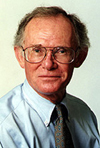Robert B. Edgerton has passed away
Professor Robert B. Edgerton passed away following a stroke on July, 2016 at the age of 84. Professor Edgerton had a distinguished 47-year career at UCLA, where he also received his bachelor’s and master’s degrees in the Department of Sociology and Anthropology and his doctorate in the Department of Anthropology. He started his long UCLA career in 1961 as a Research Anthropologist in the Department of Anthropology. He was appointed Instructor-in-Residence in the Department of Psychiatry in 1962, advancing until 1972, when he became Professor-in-Residence in the Departments of Psychiatry and Anthropology. He served for 14 years as Associate Chair for Academic Affairs in the Department of Psychiatry and 10 years as Assistant Dean in the Dean’s Office (Academic Affairs) of the School of Medicine. Prior to these appointments, Professor Edgerton served as a Member and Chair of the Campus Academic Personnel Committee (CAP). He served as the Director and the Associate Director of the UCLA Mental Retardation Research Center and as Director of the UCLA Center for Culture and Health. He wrote or edited over 30 books, 45 peer-reviewed articles, and countless chapters, forewords, and reviews. He was renowned for his elegant and wry style of writing and lecturing. He was committed to the investigation and understanding of the complexities of human nature. His intellectual contribution to the medical and human sciences was to provide a cultural and social context for understanding mental illness and the disabilities that afflict so many, and to understand the experiences of people in their local community context from their own moral and emotional points of view. His research illuminated the potentials as well as the ability, with the help of benefactors and other social and economic supports, for so many with disabilities to live in the community. Among his many influential books are The Individual in Cultural Adaptation, a study of four tribes in East Africa and the influences of ecology and culture on their beliefs and practices; Drunken Comportment (co-authored with Craig MacAndrew), which showed the very diverse behavioral responses to alcohol found around the world; Sick Societies: Challenging the Myth of Primitive Harmony, which described the conditions and signs that define troubles in such societies, and the fact that all communities, including small, traditional societies, have conflicts and disaffection; Mental Retardation, a comprehensive and cross-cultural overview of the field, along with Deviance: A cross-cultural perspective; and The Cloak of Competence: Stigma in the Lives of the Mentally Retarded, which followed the lives of men and women released in the 1950s and 1960s from state hospitals in California, documenting their struggles to re-enter society and their often-remarkable achievements. Cloak received the Distinguished Research Award from the American Society for Mental Retardation, and was for many years among the most successful and longest books in print for the University of California Press. The new and revised edition of Cloak was published in 1993 and remains in print.His eminent academic career included the distinction of being the first UCLA School of Medicine faculty member to be appointed to the position of University Professor in 1996. The title University Professor is reserved for scholars of the highest international distinction who are recognized and honored as the top scholars on their campus and are respected as teachers of exceptional ability. Furthermore, this title confers affiliation with the entire University of California system beyond the home campus. The first University Professor was Edward Teller in 1960. Professor Edgerton was only the fourth University Professor from the UCLA campus at the time.Professor Edgerton was elected Fellow to two of the most prestigious academic associations in the country: the American Association for the Advancement of Science and the American Academy of Arts and Sciences. He was awarded the Distinguished Teaching Award at UCLA in 1974 and mentored and inspired innumerable students. He served as President of the Society for Medical Anthropology (1976-77) and President of the Society for Psychological Anthropology (1985-6) (where he also received the Distinguished Career Research Award), both in the American Anthropological Association. Professor Edgerton received many other distinguished research awards throughout his long career.He is survived by his wife Karen L. Ito (Edgerton) who has established the Robert B. Edgerton Endowed Graduate Student Award in memory of Bob’s legacy as a distinguished scholar, teacher, colleague and friend. If you would like to make a gift to this fund that supports graduate students across the four sub-fields of anthropology, please visit the department’s online giving page and select the fund from the drop-down menu.A memorial gathering is planned for Fall. Further information will be forthcoming.(Karen L. Ito and Thomas Weisner)


